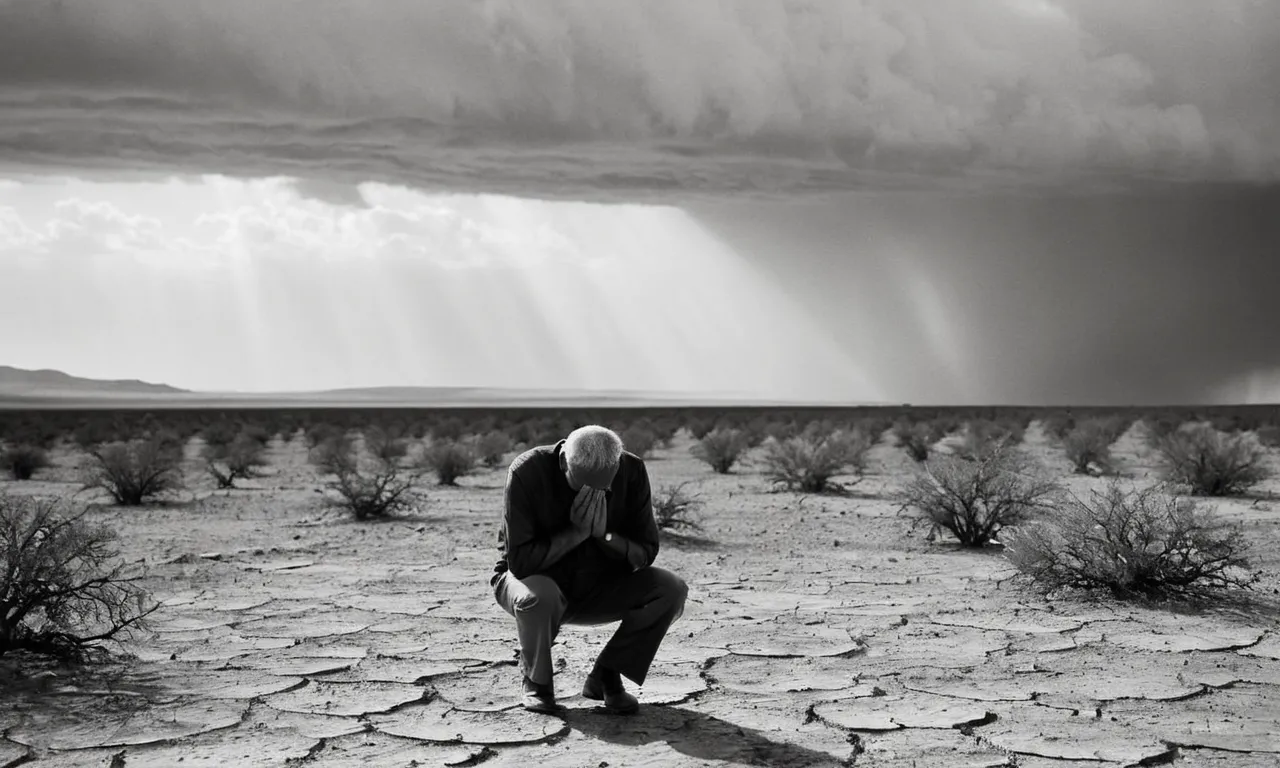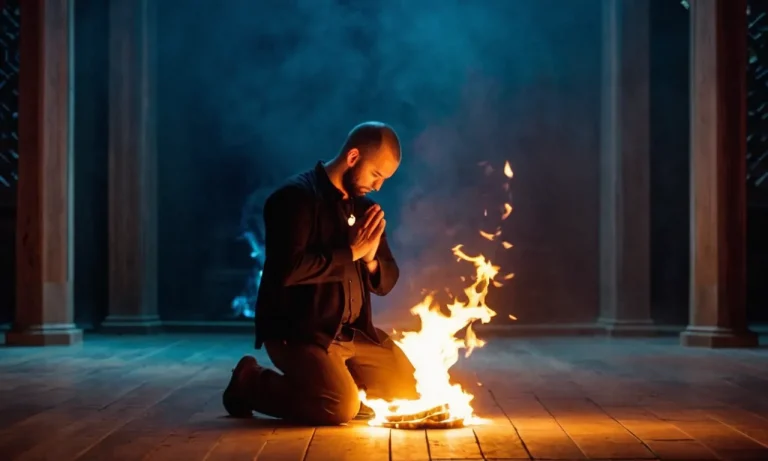Who Prayed For Rain In The Bible
Rain is essential for life, and throughout history God’s people have cried out to Him for rain in times of drought. If you’re looking for a quick answer, key biblical figures who prayed for rain include Elijah, Samuel, David, Solomon, and the prophets Jeremiah and Zechariah.
In this comprehensive article, we will explore the stories of numerous people in the Bible who earnestly prayed and interceded for rain. We’ll study their circumstances, see how God responded, and learn important lessons about prayer that can encourage us in our own relationship with God today.
Elijah’s Prayer on Mount Carmel
The Drought and Challenge to Baal
A severe three-year drought had afflicted the land of Israel according to 1 Kings 18. This drought was God’s judgement on the evil rule of King Ahab and his wife Jezebel, who promoted Baal worship instead of devotion to the true God.
Elijah the prophet boldly challenged 450 prophets of Baal to a contest on Mount Carmel to prove once and for all who the true God was. He told them each to prepare a bull to sacrifice, but not set fire to it.
The prophets who could successfully call down fire from heaven to consume the offering would prove their god was real.
Elijah’s Prayer and God’s Dramatic Response
After the prophets of Baal had tried unsuccessfully all day to call down fire, Elijah prayed a simple, 63-word prayer. Immediately as he finished, fire fell from heaven and consumed the offering, the wood, stones, dust, and even licked up the water in the trench around the altar (1 Kings 18:38).
The awe-struck people fell on their faces and declared “the Lord – he is God!” (1 Kings 18:39). Then at Elijah’s further prayer, rain finally returned to the land, ending the devastating three-year drought.
This amazing story displayed God’s awesome power and proved he alone was the true God of Israel.
Samuel Prays for Rain and Thunder
The story of Samuel praying for rain is recorded in 1 Samuel chapter 12. At this time, Samuel was leading Israel as a Judge. The people had asked for a king instead of having judges, and Saul had recently been anointed as the first king of Israel.
Samuel called all the people together at Gilgal to reaffirm Saul’s kingship. He also wanted to testify that he had led the people faithfully by God’s direction. Samuel reminded the people of God’s faithfulness to them throughout their history. But the people had rejected God by asking for a king.
This made Samuel sad, but he encouraged the people to still wholeheartedly serve and obey God.
It was during the wheat harvest, in May or June, when rain rarely fell. But God sent thunder and rain that day, probably as a miraculous sign to authenticate Samuel’s leadership and message. The people greatly feared God and Samuel as a result of this miracle.
Some key points about Samuel praying for rain:
- God used the thunder and rain miracle to establish Samuel’s authority, since the people had rejected his leadership.
- It showed that God was still actively involved with Israel, despite their sin in asking for a king.
- The timing made the rain even more spectacular – it normally didn’t rain at harvest time.
- The miracle caused the people to fear God, reminding them of His power.
So while a simple prayer, Samuel’s request for rain served several divine purposes. It was a stern reminder to Israel about who was really King. And it showed that while God may have granted their request for an earthly king, He would still hold them accountable to obey and follow Him.
David’s Prayer for the Land
In the Bible, King David prayed fervently for rain during a severe drought that afflicted the land of Israel. David’s passionate prayer is recorded in 2 Samuel 21, where Israel was suffering under God’s judgement due to Saul’s past sins against the Gibeonites.
The drought had lasted for three consecutive years, bringing famine and great suffering to the people. David urgently sought the Lord’s mercy and favor upon the land. The Bible says David “sought the face of the Lord” (2 Samuel 21:1).
Seeking God’s face indicates David’s sincerity and desperation in his prayer for rain.
In his prayer, David appealed to God’s divine attributes – His righteousness, faithfulness and compassion for His people. David prayed, “Let us fall into the hand of the Lord, for His mercies are great, but do not let me fall into the hand of man” (2 Samuel 24:14).
David understood that it was better to receive God’s disciplinary judgement directly than to continue suffering famine and drought.
After his passionate prayer, God heard David’s plea and answered his request. The Lord sent rain upon the land and ended the famine in Israel (2 Samuel 21:10). The people’s suffering was relieved and the land was restored.
David demonstrated true leadership by interceding for his people, rather than accusing or blaming them.
Through David’s example, we learn the power of earnest prayer, repentance and reliance on God’s mercy in times of hardship. Even when God’s discipline falls on a land, a leader who prays and seeks God’s face can change the course of events and usher in healing and restoration.
Solomon’s Prayer of Dedication
King Solomon’s prayer at the dedication of the temple is one of the most powerful prayers recorded in the Bible. After seven years of construction, the magnificent temple in Jerusalem was finally complete.
King Solomon gathered all the elders, leaders, and people of Israel for a joyous dedication ceremony to present the temple for God’s glory. At this auspicious event, Solomon offered up a beautiful, heartfelt prayer to dedicate the temple to the Lord.
In his prayer, Solomon humbly recognized God’s supreme greatness, sovereignty, and faithfulness to keep His promises (1 Kings 8:23-24). He pleaded for God to hear the prayers offered at the temple and have mercy whenever the people repented and turned to Him (1 Kings 8:30, 33-34).
Solomon also earnestly asked the Lord to hear the foreigner’s prayers so all nations would know the Lord’s name and fear Him (1 Kings 8:41-43). This shows Solomon’s deep desire for God’s glory to fill the whole earth.
Furthermore, Solomon pleaded with God to answer the people’s prayers during times of drought, famine, defeat in battle, and exile when they sincerely repented and sought the Lord’s forgiveness and help (1 Kings 8:35-37, 44-50).
He recognized that God’s people would sin and need forgiveness repeatedly. Solomon knew only the Lord could restore and heal the land when His people genuinely turned to Him.
The prayer reflected Solomon’s spiritual maturity, humility, concern for God’s glory, and love for God’s people. Though the magnificent temple was his crowning achievement, Solomon rightly directed all praise and honor to the Lord.
His passionate prayer shows that the temple was dedicated first and foremost for worshiping Yahweh, the one true living God. The Lord was greatly pleased with the temple and Solomon’s prayer, filling the temple with His glory cloud (1 Kings 8:10-11).
Centuries later, Jesus referenced Solomon’s prayer when cleansing the temple, saying: “Is it not written: ‘My house will be called a house of prayer for all nations’? “ (Mark 11:17). Through Christ, God’s temple is now in the hearts of believers, and Solomon’s prayer reminds us to earnestly seek God’s glory and dependently bring our petitions and praise to the Lord.
Just as God heard Solomon’s prayer, He hears and answers believers today who seek Him with humble, repentant, and worshipful hearts.
The Prophets Jeremiah and Zechariah
The prophets Jeremiah and Zechariah both prayed for rain during times of drought in the Bible. Their prayers provide great examples of crying out to God during difficult times.
Jeremiah’s Prayer
The prophet Jeremiah lived during a spiritually dark time in Judah’s history. The people were rebelling against God and engaging in idolatry. As a result, God was disciplining them through drought and famine.
Jeremiah called the people to repentance, but they refused to turn from their sinful ways (Jeremiah 14:1-12).
Seeing the people’s stubbornness, Jeremiah cried out to God in prayer, pleading for mercy. He acknowledged that Judah’s only hope was God’s compassion and grace. Jeremiah asked God to act for the sake of His name and His covenant with Israel (Jeremiah 14:13-22).
God responded that even if righteous Moses and Samuel stood before Him interceding, His judgment would not be repealed. The people’s sin was too great (Jeremiah 15:1-9).
Though God did not relent from the drought, Jeremiah’s prayer stands as a moving example of one man interceding on behalf of a wayward nation.
Zechariah’s Prayer
The prophet Zechariah lived centuries after Jeremiah. The Israelites had returned to Judah after 70 years of captivity in Babylon. They had rebuilt the temple and repaired Jerusalem’s walls. However, the work had stalled, and the people struggled to survive drought and poor harvests (Haggai 1:6, 9-11).
Zechariah exhorted the priests and the people to wholeheartedly return to God. He called them to repent of their apathy and lack of obedience. In response, the leaders repented, and Zechariah prayed a powerful prayer recorded in Zechariah 10:1.
He pleaded with God to send rain to end the drought. Zechariah based his request on God’s covenant promises of blessings for obedience. God answered Zechariah’s prayer by sending rain shortly thereafter (Zechariah 10:2-3). The prophet praised God for His faithfulness and goodness.
Lessons from These Prayers
Jeremiah and Zechariah’s prayers teach us valuable lessons about crying out to God:
- Prayers of repentance unlock God’s mercy and grace.
- God is faithful to His promises.
- One person’s intercession can impact many.
- Honest lament moves God’s heart.
- God desires intimate relationship through prayer.
During times of hardship, we can come boldly before God’s throne of grace like Jeremiah and Zechariah. As we persevere in prayer, we will experience His comfort and find hope in His unfailing love.
Conclusion
In closing, we have seen the passionate prayers for rain offered up by some of the most important figures in the Bible. God promises that when we call on Him, He will answer. May the examples of these faithful prayers inspire us in our own relationship with God.







